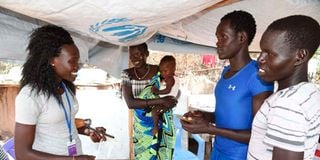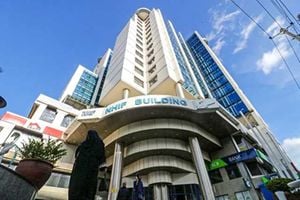Sports can help us build a better world for all

Refugee athlete Rose Nathie (left), her mother Verenika Nakitizi, her brother Tom Namilo and Simon Lokonyen, their relative, at their home in Kakuma Refugee camp in Turkana County on June 15, 2019.
What you need to know:
- We toured the Kakuma Refugee camps and Kalobeyei Refugee Settlement in Turkana County, northern Kenya, a few weeks ago.
"Running is like medicine for me, when I run it helps me relieve all of the stress that I have."
These powerful words of Anjelina Nadai, a South Sudanese Refugee Athlete Scholarship Holder under the auspices of the National Olympic Committee of Kenya (NOC-K), reinforce the power of sports, protection and peace building.
We toured the Kakuma Refugee camps and Kalobeyei Refugee Settlement in Turkana County, northern Kenya, a few weeks ago.
Last week, the Global Refugee Forum was held in Geneva to address the global refugee crisis. Sports made its point as an avenue for re-integration of refugees into society.
As much as the matter of forceful displacement of persons is a global issue, sports federations and organisations have strongly supported efforts in addressing the challenges of this growing global crisis.
The sector plays a vital role through sports for protection efforts.
NOC-K joined the consortium for the Sports for Refugee Coalition in giving a Joint Pledge on Sports for the Inclusion and Protection of Refugees.
NOC-K subscribes to the values of Olympism, whose vision is to build a better world through sports.
As part of the Olympic Movement, NOC-K creates its programmes around the IOC’s Agenda 2020+5, where Recommendation 11 speaks on the commitment to use sports to benefit displaced persons and their host communities.
With this background, we are passionate about lending our human and strategic advantages in sports to advance the interests, dreams and well-being of displaced persons in the country and beyond. In solidarity with other global bodies taking the Joint Pledge, NOC-K pledges specific commitment areas.
The first is to create an enabling environment by supporting national federations to extend their sports to refugees.
In the NOC-K General Assembly held last week, the message was clear to the affiliate members.
We will support them actualise this in 2024, particularly in Kakuma, to benefit the refugees and host community.
Secondly, we should integrate refugees and host communities in our promotions for safe sports with our existing initiatives.
NOC-K is integrating other athletes at the training camps hosting our scholarship refugee athletes to create an enbaling environment that eases their feelings and the effects of displacement.
We commit to continue enhancing the skills and pathways of youth refugees. NOC-K is supporting eight elite athlete refugees in Kenya in their sporting dreams through Olympic Solidarity Scholarships.
This is in addition to the five youth refugees on a college education scholarship to support their career pathways. In collaboration with our national federations, we will remain robust in promoting the capacity development of coaches and sports administrators targeting refugees and host communities.
Finally, we commit to exploit our media resources and platforms to contribute to evidence, communications and advocacy to tell and elevate the stories of refugee athletes and their host communities to facilitate their integration, dignity and well-being.
“No one becomes a refugee by choice, but the rest of us have a choice about how we help,” Filippo Grandi, UNHCR High Commissioner for Refugees.
Mutuku is the Secretary General of the National Olympic Committee of Kenya. [email protected]





